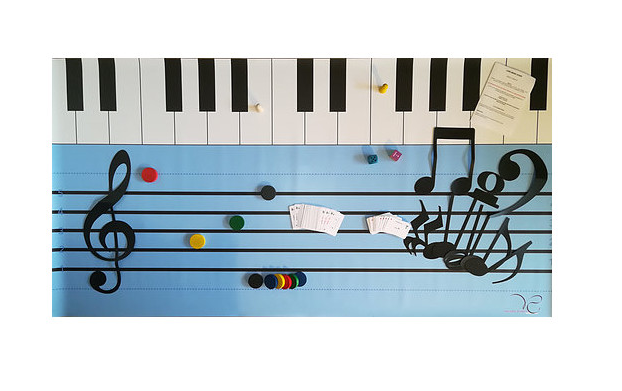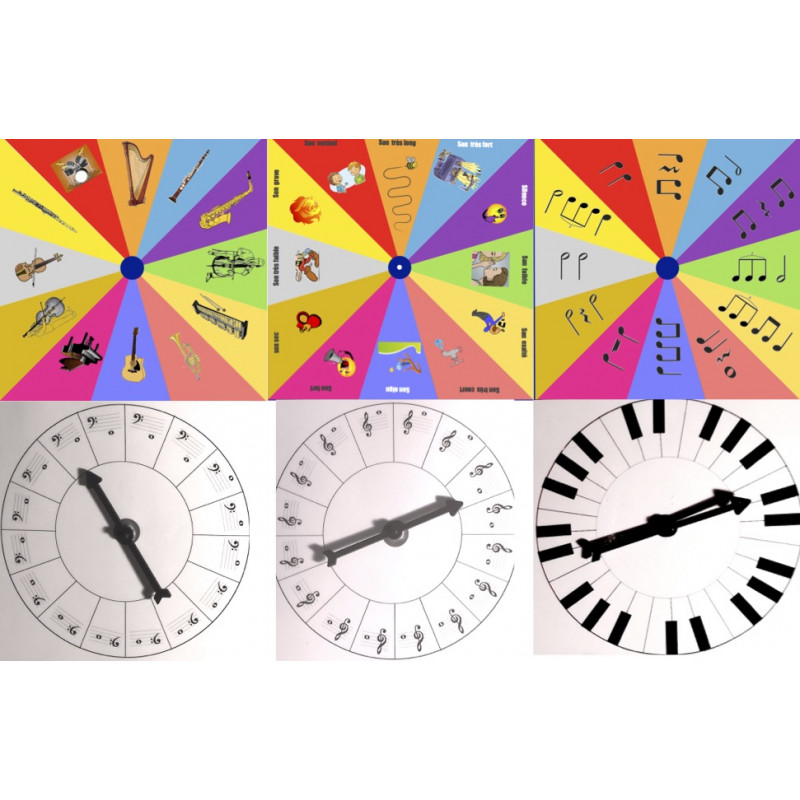Teacher To Teacher: Piano Games from Valerie Sabbah (MGBH)

Interview by Esther Basha
In this issue we are launching a new section “Teacher to Teacher,” where piano teachers around the world will be able to have an opportunity to share their insights and experiences with their colleagues.
In this interview, Valerie Sabbah, a Montessouri music and piano teacher from France, shares her story and presents the music games she has created for children.
Piano Performer Magazine: What town did you grow up and how did you get introduced to music?
Valerie Sabbah: I grew up in Bougival, a small town 10 km from Paris. There I started learning music between the ages of 8 and 12 in a local music school. As a teenager, I decided not to continue since learning to read music was very difficult for me at that time. It wasn’t until my late teens when I finally came back to it and then completed the music studies program at the age of 20. I had the opportunity to study with such renowned pianists and teachers as Janine Vieuxtemps (MGBH), Jean Fassina (MGBH), Christophe Brillaud (MGBH) (former student of Aldo Ciccolini (OBM)), and Yacov Aïvaz (MGBH) who was a pianist at the Moscow Philharmonic.
PPM: What made you want to become a music/piano teacher?
VS: Although I graduated from a music program, I didn’t feel a drive at that time to pursue it professionally. I became interested in interior design, and while I was going to school for it, I used my music training to help me finance my studies. The first student I had changed my life. He was autistic, but his father didn’t tell me about it. Probably, so that I could teach him music in the most natural way possible. I had to create a whole bunch of musical games in order to see what he understood and what he didn’t, and thus, to help him as much as possible. That’s how I discovered my passion for children and teaching.
The first student I had changed my life. He was autistic, but his father didn’t tell me about it. Probably, so that I could teach him music in the most natural way possible.
PPM: What music teacher had the biggest influence on you and why?
VS: Jean Fassina (MGBH). He taught me to hear and work on hand movement awareness. It was a very long and difficult job, but it changed the way I played. It was through him that I discovered the parallel world of music – the one where we discover that the most important thing is not the note, but the sequence from one note to another and the sound quality.
PPM: Today you teach music at the Montessori school in France. What is the Montessori approach to music education? What ages do you teach?
VS: Montessori is a gentle approach to learning, without any force. It is not the child who adapts to the method, but rather the teacher who adapts the method to the child. This is why manipulation of objects is very important in this approach, because it allows the child to understand through his or her own experience/experimentation vs through learning only in an intellectual way.
In my current school, I teach about a hundred children (5 classes) 3 to 10 year-olds.
This quote by Benjamin Franklin (OBM), which I use regularly, sums up the Montessori philosophy well, “You tell me, I forget. You teach me, I remember. You involve me, I learn.”
PPM: Please, tell our readers about your music games and what inspired you to create them.
VS: I was committed to adapting to the needs of the students.
Personally, I wasn’t a very good student at the music school, and I would often hear sentences like “you’re not cut out for music”… My heart, however, told me the opposite: when I watched a movie, it was mostly because I liked the music, and I could wait until the end to hear 3 magical notes.
So, I persevered in music while continuing other studies, just in case, then I met the right people.
What inspired me to create musical games is the same reason that led me to become a music teacher. I was committed to adapting to the needs of the students.
Today, I also compose music. Two of my songs are played in music schools in France – including the conservatory where I studied – and my games are used in most music schools in France.
Currently one of the songs is being recorded by Giovanni Mirabassi (MGBH), Karol Dobrowolski (MGBH) and Greg Zlap (MGBH).
I am committed to making music theory easy and accessible to everyone. I would like to give teachers and students educational tools that will allow them to have more fun learning something that is often perceived as complicated when it is not.

First, I created the Music Story game – a solfege mat – one or two staffed – depending on the instrument one plays. The counters represent the musical notes and the sticks are the pulsations.
First, I created the Music Story game – a solfege mat – one or two staffed – depending on the instrument one plays. The counters represent the musical notes and the sticks are the pulsations. There are also basic musical symbols. The teacher offers games of notes, rhythms, dictations, singing etc., and the child can discover music theory through a game. The student does not realize that he is learning something that is normally learned from books.
This game has several versions. A version for parents/families, which is Social Music Story, whose objective is to have crossed the keyboard first. All other versions are intended for teachers or parents who wish to provide their music teacher with a medium to teach music theory.
Thanks to this game, you can learn music theory and play music from the age of 3. Starting with a music story, a few months are enough at that age to master the process of reading notes and rhythmic bases.
In my online shop, you can also find games to discover musical instruments or have fun with sounds, such as the Bingo Game, the International Cone Game, the Instrument Wheels, the Toddler Sound Level Meter, the Sound Mill as well as card games to work on your notes or rhythms.
PPM: Please, tell us about your Music Wheel Game. It sounds interesting.
VS: In music lessons, I use the wheels according to the age and level of the children. With the smaller ones I will use the Musical Instrument Wheel, the Sound Level Meter or the Wheel with the Keyboard. With the older ones, we will use the Note Wheels or the Rhythm Wheel instead.

They are all used in the same way, you turn the arrow and you have to imitate the sound, name the instrument (and imitate it), sing the rhythm or say the note on which the arrow has stopped. Personally, I regularly use the instrument wheel, the sound level meter, and the wheel with the keyboard during musical awakening sessions with toddlers, and in groups of about 12 children, the children turn the wheel one after the other, and usually impatiently await their turn. Concerning the other wheels, I use them either in class with the older ones or in private music lessons.
PPM: What advice can you share with young music teachers who are just starting up?
VS: We must strive to find the right balance between play and discipline. The game must serve the learning process, but the course must under no circumstances be transformed into a playground. However, the adult must enter the child’s world for the child to want to listen and, therefore, learn. For me, a good teacher is a grown up who can connect to his child within. You can relate a message and teach anything by making it fun!
PPM: Where and how can other music teachers order your games to incorporate them in their teaching practice with their students?
VS: For the moment, the US based teachers can purchase the games on my website: https://www.valeriesabbah.com/gb/ There is a discount code the the Piano Performer Magazine readers – enter “PianoPM-10” to get 10% off excluding shipping. Allow 10 to 15 days for delivery. If a customer needs additional information about a product before committing, he can contact me by email at clesdelamusique(@)gmail.com, or via Whatsapp.
PPM: Thank you, Valerie. We hope your creativity and desire to share and spread the love will be appreciated by your US colleagues.
 Piano Performer Magazine
Piano Performer Magazine 







Where can I buy them
Please, read the excerpt below;
“VS: For the moment, the US based teachers can purchase the games on my website: https://www.valeriesabbah.com/gb/ There is a discount code the the Piano Performer Magazine readers – enter “PianoPM-10” to get 10% off excluding shipping. Allow 10 to 15 days for delivery. If a customer needs additional information about a product before committing, he can contact me by email at clesdelamusique(@)gmail.com, or via Whatsapp.”